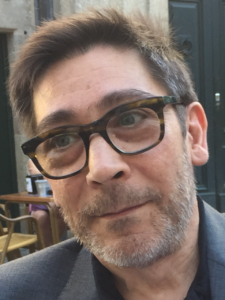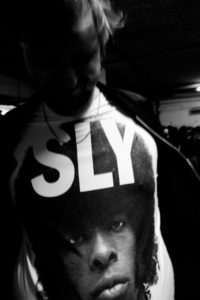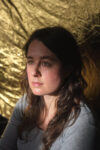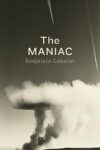
Germán Sierra
A Conversation with Shane Jesse Christmass and Germán Sierra
When I was a child I had a cartridge for my Commodore 64 that could tell you comparative facts about the different planets in our solar system. The one that stands out to me was how much a teaspoon of lead would weigh on Jupiter—don’t look it up, it’s not as impressive as I remembered. In my imagination though, that kind of stupendously improbable compaction of mass is a quality that the writing of both Shane Jesse Christmass and Germán Sierra share. Every word in their work has the gravitational psychosis of the entire language that bears it. And each sentence has enough fibrousness to serve as fodder for an entire book that any normal person could write. So, the expectation of listening in on a conversation between them has been, in short, crushing. — John Trefry
GERMÁN SIERRA: I remember reading in one of your tweets that you don’t like it when your writing is referred to as “experimental writing.” This is something I’ve frequently hear from writers who are often described as “experimental,” “innovative,” “avant-gardist,” etc. “I don’t experiment, this is my life” — you wrote. Agustín Fernández Mallo says that the actual “experiment” would be trying to describe our contemporary world using 19th c. novel’s fictional structure, which reminds that John Trefry also wrote that Naturalism was the experiment, and it failed.
In my case, however, I don’t mind being described as an “experimentalist,” but maybe this is also because, as a scientist, doing experiments is a significant part of my life. I probably see the term “experiment” from a different perspective—not as trying to force myself into doing something “different” (which may also be), but as the formalization of an investigative process in which you might find that, as Harry Mathews wrote, “you can discover what you didn’t know you knew.”
I wonder if the common discomfort with being described as “experimentalist” is just a manifestation of a more general rejection to be classified within a kind of “highbrow genre.” Julian Rìos (probably my favourite contemporary Spanish author) told me once that we should not allow ourselves to be “marginalized” into any kind of experimentalist or avant-gardist literature, as we were following the main literary tradition, what Ronald Sukenick dubbed “the rival tradition”: “What I’m writing is not in an avant-garde mode, and certainly not in an experimental mode, and certainly not in an “alternative” mode. It comes out of a rival tradition, and it’s much older and much bigger than the tradition of realist fiction, which only started in the 18th Century. Whereas this rival tradition you can trace all the way back to the epics, Ovid, Rabelais, and even at the beginning of the realist tradition, to Laurence Sterne, and Diderot, and so on. This is a tradition that’s beginning, I think, to break loose again.”

Shane Jesse Christmass
SHANE JESSE CHRISTMASS: I think it comes down to not wanting to be fixed into a definition, and a definition that I don’t think adequately describes me. I also don’t like to think about it too much. The writing is the writing, and someone else can analyse it. However, like I said, this is how I see life, it seems dismissive to say it’s an experiment. It seems to undermine it somewhat. Like you mention, much like Rìos said to you, why allow myself to be marginalised, and to be marginalized by laziness. It’s too easy to say something is experimental, like it’s some type of stopgap. That description isn’t any analysis of the work itself. But it makes me sad, really sad, as I feel dispirited, that it’s not going to be taken seriously, because people don’t know how to describe it adequately. Now I need to bear responsibility there, but I guess the tropes, the clichés of what people think of when they think of ‘experimental writing’ is what turns me off from that definition, because people will think that’s what my writing is about. I have a plot, characters, there’s not much messing around with form. Messing around with form is what people do who can’t write. You see what happened there though. I said it, and it’s what people think when they hear the term ‘experimental.’
But, but, here is where I contradict myself. I also discuss it in my novel Napalm Recipe: Volume One – I’m more than happy to progress the novel, and that’s the difference. The novel needs to progress, language needs to advance, and as you say, not use 19th Century methods to tell my story today in 2018. I am interested in disregarding the conventional structures of a novel. I disregard the doorkeepers for a variety of, for numerous political and aesthetic reasons. Adjectives are miserly. We should use parentheticals instead. I feel that novels should use repetition of sentences, images need to cause dislocation, or a jump-cut in narrative. If you reject me, then I reject your introduction, beginning and end. To renew and to constantly evolve—that’s my genre.
I do like your definition that to experiment is to investigate further. In your novels, surely you don’t sit down before writing, or at any time during the writing and think that the purpose is to investigate further. Wouldn’t that be a thing that happens after?
Yes, of course, this is something that happens during the writing process. Actually, I never have any plan or intentions before writing a text—even this “before” is not very accurate, as I usually don’t know where my writing process starts or where it’s leading me… I rarely “sit down before writing”—but this has probably less to do with any particular working method than with my lifestyle: I’m trying to simultaneously do many apparently unrelated things all the time. Something might start as a fiction and end as an essay or vice versa…
I like your idea of renewing and constantly evolving, this somehow fits my idea of writing much more than any predetermined aesthetics. Writing, for me, means threatening language (in a similar way that science is a threat to reality)—often threatening fiction as a function of language. And this is maybe why my texts never fit into any of the “aesthetic trends” I’m theoretically interested in (like conceptualism, Fluxus or other avant-guardist movements). At the end of the day, my writing reflects my serial attempts to navigate a diversity of cognitive environments, not the need to tell a story or to make an aesthetical or political statement.
I’m very interested in your asymmetrical use of repetition in Police Force as Corrupt Breeze, it creates continuous feedback loops, producing a disruptional continuum (a “drone dimension”) which develops into a very musical text. Actually, when I listened to your recent electronic soundtrack for Russell Bennetts’ & Rauan Klassnik’s “The Red Bird”, it kind of reminded me the sensation of reading Police Force…
Do you think the evolution of the novel—and fiction in general—is (at least partially) being fueled by the authors’ openness to non-textual art forms?
Music is a huge part of my life. If it’s not playing 24/7, then I go a bit nuts. I also am in several bands. Just to digress from your questions above. My own musical output came about due to procrastination from writing. One day I wasn’t particularly keen on writing, which is a ridiculous thing for me to say, given I have a pretty extreme work ethic when it comes to writing, for instance I have committed myself to finish and published a novel a year until I die. But, on this particular day, I decided that if I was not going to write, I was still going to do something creative, you know, I wasn’t going to go downstairs and watch TV, you know, real procrastination. Not that there’s anything wrong with TV, lots of great plot ideas can come from TV, or tabloid newspapers. Anyway, I just downloaded some music software, and now it’s out of control, and have several albums released, and got that wonderful opportunity to provide music to those Klassnik and Bennetts pieces. We’re actually working our way very slowly to a full-length release. Russell just sent me audio of himself reading from Yeezus In Furs on the Hampstead Heath. What’s that Gysin quote, “I enjoy inventing things out of fun. After all, life is a game, not a career.”
In regard to your specific questions concerning feedback loops, that is it exactly. It’s there to produce a sense of disorientation. This is where I probably contradict myself concerning my previous answer. But why should I have to write using the conventional structures of the novel. I’m going to disregard that. You want to ‘find your own voice’—well then construct structures that allow you to. Why shouldn’t I cause the death of characters only for those characters to appear later? Probably abhorrent to conservative mores, but why shouldn’t there be the interchangeable sexes of characters, or a somnambulist drift between tenses. Even better if this happens within the same sentence. If an author is going to utilise their imagination, then let’s take pleasure in, and promote, the instability of meaning. I firmly denounce any synopsis, or narrative, that has to be reduced to goal, motivation or conflict. It seems quite pithy. So yes, I do think the evolution of the novel does need to incorporate the transposition of other literature formats into novel, for example movie script or newspaper structure, but there also needs to be the implementation of doodles, image macros or GIFs. They’re all base level suggestions, there’s nothing wrong with going further, perhaps an elevation of an intensified sense of vagueness with regards to a character’s POV.
I’m curious, you have no plans, or intentions before writing a text? You must have some structure, or even a vibe of what the book will be? Even just a title? Ever written a book around just a title that you had beforehand?
The title is usually the last thing I decide… Actually, when working on fiction, I wouldn’t say there is a proper “before writing a text.” I’m most of the time taking unrelated, disparate, fragmentary notes with no other plan or purpose than using them later. Obviously, most of these notes will be discarded, but some of them grow and start to make some sense and to become related to each other. Surprisingly, this works for me in constructing both fragmentary narratives (such as Standards and The Artifact) and more linear-y narratives (like some of my previous novels). As I said before, I usually spend more time trying to find the “right order” for the fragments than on writing them. Anyway, this is more a consequence of my working schedule: I never had time to work continuously on a book, so I got used to work in a discontinuous way. I’ve always wondered what would happen if I ever had the possibility to focus on a book for, let’s say, three months in a row…Would I do things the same way…?
I’m quite aware of those kind of constraints—how my writing style might be influenced or even directed by “external” conditions more than by my own will. It’s not that I ever practiced any kind of attempt to do “automatic writing”, but I don’t try to fight the continuous interruptions and noise arriving from my own different activities and from my opening to many disparate outside influences. I mean, I would never consider to write fiction in English if it wasn’t because of Twitter…
Regarding this, I am really amazed with the global artistic/literary communities constantly emerging online in the last few years. Editorial projects like Dostoyevsky Wannabe or Inside the Castle wouldn’t be possible without their support. What do you think about the role of this recent flourishing of tiny—but extremely interesting—independent publishers?
Yeah, it is true. There is a network of writers that have all contacted each other, who will more than likely never meet in real life. Which is what I find quite remarkable. In my country there is a certain path … and certain journals … and then certain festivals you need to go to be successful, or actually, to be knighted as successful by those certain journals, certain festivals. But I can’t be bothered. I know where I stand. Those certain journals will only publish a certain type of writing. I also don’t particularly like hobnobbing, or going out much. There’re certain events that are sort of a prerequisite for being seen and noticed. And basically, I can’t be fucked. I mean I didn’t start writing so I could meet lots of vacuous people. But this is where the internet comes in. I’m having a conversation with you now. You like me. I like you. We enjoy each other’s writing. The internet has opened up a greater pool to me of less vacuous people. I still have to find them, for example: Dostoyevsky Wannabe, but they’re there. There’s nothing like Dostoyevsky Wannabe in my country. But, I guess that’s what the internet has done, made it so I’m not restricted by the limited and blasé options that my country offers.
Yes, I fully understand that. It’s the same for me; I live in a small town, away from the Spanish “literary centres,” and I also find the cultural scene in my country boring and uninteresting most of the time… I tried to be more involved in all that some years ago—going to events and organizing writer’s congresses. Borges said once that he was prouder of the books he’d read than of the ones he’d written, and I actually believe to have been more efficient in promoting other authors than myself, something that it’s quite unusual (and often misunderstood) here…
Anyway, I’m less interested in the socio/promotional aspects of the after-publishing than in how the (post)digital environments influence writing itself. As little as I care about who could be the “potential readers” of my work, there is a vague image of a readers’ community becoming more diverse and complex, and I believe this is helping to shape a new “scattered insolence” (which could also be called “global avant-gardism”, but the former sounds kind of cooler to me). Good enough to keep doing your thing, but also good enough not to feel completely isolated. This is maybe my main reason to support independent publishing—not only to keep a decent visibility for interesting contemporary works, but also to sustain an environment where “insolent” aesthetical debate could have a place.
Scattered insolence is a great phrase. Seems apt. You’ve read Gaudy Bauble? Or followed the success that that book has been generating? I think that is a really good example of putting a foot to the throat of traditional structures. I think I’ve turned full circle in terms of my reading input due to this rise of this scattered insolence. In my teens and twenties, I seemed to read more historical or ancient, rather than contemporary work. I’m reading more work that was published last week these days. However, reading habits are also dictated by reading everything so that you can unlearn everything. I’m going to read everything on a certain subject These sorts of behaviours.
I’m curious about cognitive neuroscience. For a layperson, what is it and does it have any impact on your fiction. I mean, I would think it does, but can’t imagine in what context?
Yes, Gaudy Bauble is a great example. In a different context, similar to what happened in Spain with Agustin Fernández Mallo’s Nocilla Dream. I really understand what you say about the changes in your reading habits. I said once that when I was in my twenties I used to read books from dead authors, in my thirties from my contemporaries, and now I’m reading, and learning a lot, from writers who are much younger than me—many of whom are re-taking aesthetic issues and projects initiated by the historical avant-garde. I’ve just read an interview with Martin Amis where he states, once more, that nobody wants to read ‘difficult books’ anymore. I find annoying the idea of calling a challenging book ‘difficult’. For me, not challenging books are ‘difficult’ to read because I get easily bored with them. And I really think that many people are interested in reading books that question their worldview (but maybe I’m being too optimistic here…)
Cognitive neuroscience studies the neurobiological processes involved in what has been called the brain’s “higher functions,” such as learning, memory, emotions, consciousness, etc… I did some research on memory circuits in the prefrontal cortex long ago, but now I’m more into neurochemistry/neuropharmacology (like searching for molecular targets for new drugs in the brain). Actually, I do not translate my specific research work into fiction, but, of course, neuroscience, medicine and biology are influential in my writing. There are two kinds of scientists: the sceptics (those who focus on being aware of what we don’t know) and the pragmatists. I’m much closer to the first type. When writing fiction, I’m more interested on how science affects our socio-cultural environment than on ‘scientifically explaining’ things. After all, most contemporary metaphors of the human come from science, but they’re still metaphors, and I try to treat them as such. I’m particularly interested in those aspects that subvert the ‘manifest image’ of the human and the Universe, rather than in those that confirm our perceptions and beliefs. I guess this is also a way to ‘challenge’ the reader…
“Subverting the manifest image of ourselves and the Universe”! — I got heavily into mystics and mysticism, that book by Evelyn Underhill, in my twenties. She also seemed to refer to those mystical experiences as something that is beyond human knowledge. It always stayed with me. I’d like to think that that’s where writing heads to. This area that is just beyond our human knowledge. I’m not even sure what that means exactly.
A friend of mine said that while he was reading Eden Eden Eden by Guyotat, that he could only read a page at a time as he got delirious and had to place himself between his bed and the wall to recover from the delirium. As he was relaying this experience back to me, all I could think of was how could I write whereby the writing caused such a physical reaction.
What are your thoughts on superstition then? The reason why I ask this is I’ve always had this recurring dream whereby the sky is grey, overcast. A rain shower has occurred, it’s cold, everything is wet. Car wreckage everywhere, doors open, car parts strewn. The setting appears to be a very dreary English coastal town. I’m looking at this scene, but it’s clear that this is how I die, in fact, I’m actually walking and standing, looking at this accident. For years I couldn’t get into a car because of this. It was probably my one neurosis. I haven’t had this dream for a while. Do you have a recurring dream of any type?
There’s that folk Galician saying: “I don’t believe in witches, but they do exist…” I consider myself a very sceptical person, yet I’m very interested in the “theoretical” aspects of superstition. We behave accordingly to sets of beliefs—even what we consider “rational” or “scientific” knowledge is deeply entangled with complex and variable sets of beliefs. A great deal of my fiction is related to the socio-cultural consequences of beliefs about science and technology, to how new superstitions arise and how they become myths and shape societies. I’m even more interested on hyperstitions—fictions that produce their own reality.
I can’t remember having recurring dreams since childhood, and I can only recall some isolated features, like being chased by a shadow across a very particular architectural setting. I have the memory of having other recurring unpleasant dreams, but their content seems to be lost forever.
I fully understand your friend’s experience with Eden Eden Eden. When I first read it, I became really obsessed with it. It was, as your friend said, a very physical experience, like the sustained thrill of being trapped in a very exciting but dangerous place, or listening to black metal…
I love risk-reading as much as risk-writing. I enjoy being challenged by a book—playing, at least in theory, with the superstition/myth that books that can kill you or, in the Cervantesque/Lovecraftian tradition, might drive you crazy.
After reading Belfie Hell—one of those books that get deeply into your head—I wouldn’t like to end this conversation without dropping the just-made-up-for-the-occasion concept of “wrioting”. In my opinion, “riot aesthetics” is one of the singular features of the best contemporary writing (somehow related to what my friend Eloy Fernández Porta called ‘rhetorical punk’, and also to Joyelle McSweeney’s ‘Necropastoral’), and your books are a wonderful example of its deployment. We live in a world where, not just some people in some circumstances, but reality itself is always rioting, like if it was continuously fed with mutagenic Dionysian radiation. Guyotat expresses that masterfully, in every sentence, in every word. And so do Sean Kilpatrick and Kenji Siratori. It’s not just chaos, but grotesque, violent chaos. Like Natalie Portman says at the end of Alex Garland’s Annihilation, “not destroying, but making something new’. Of course, this comes from what I consider the most noble literary tradition in the West—the Rabelaisian one. I always liked the idea that technologies of control are actually driving us into a kind of orgiastic experimental dystopia… In Belfie Hell, the grotesque is enhanced by the continuous references to the celebrity cult machine—probably the weirdest aspect of contemporary pop culture—that somehow reminds me a couple of recent books I love: Jarett Kobek’s If You Won’t Read, Then Why Should I Write? and Kate Durbin’s E! Entertainment. The ‘abject celebrity’ has become the main 21st century’s sin-eater, they play the role of clonal Dorian Grey’s portraits, turning themselves into media zombies by absorbing all social ills. In this sense, celebrities function in Belfie Hell like the strange creatures displayed along Bosch’s Garden of Earthly Delights, driving “regular people” and everyday things into the uncanniest rhythms, shapes and behaviours. It’s the hell of a riot of a book!
Thanks for the kind words. I’m reminded of Robbe-Grillet here. He describes the novelist’s critical consciousness. Say for instance someone asks a novelist why that novelist has written their book, Robbe-Grillet states that the novelist only has one answer: “To try and find out why I wanted to write it.”
SHANE JESSE CHRISTMASS is the author of the novels, Napalm Recipe: Volume One (Dostoyevsky Wannabe, 2017), Police Force As A Corrupt Breeze (Dostoyevsky Wannabe, 2016) and Belfie Hell (Inside the Castle, 2018).
GERMÁN SIERRA is a neuroscientist at the University of Santiago de Compostela in Spain and author of contemporary innovative fiction. He has been included among the “Mutantes” or “Afterpop writers”: a group of Spanish writers who are strongly committed with innovative literature. Most of his fictional work deals with metamediatics and the role of science and technology as cultural discourses in post-postmodern and posthuman societies. He has written five novels. Efectos Secundarios was awarded the Jaen Prize in 2000. His first book composed in English, The Artifact, will be published by Inside the Castle in autumn of 2018.
John Trefry is an architect and the author of the novel PLATS, the caprice THY DECAY THOU SEEST BY THY DESIRE, and the forthcoming APPARITIONS OF THE LIVING, his work has appeared on The Fanzine and forthcoming on Black Sun Lit. He contributes to Entropy Magazine and Minor Literatures. He lives in Lawrence, Kansas.
This post may contain affiliate links.







